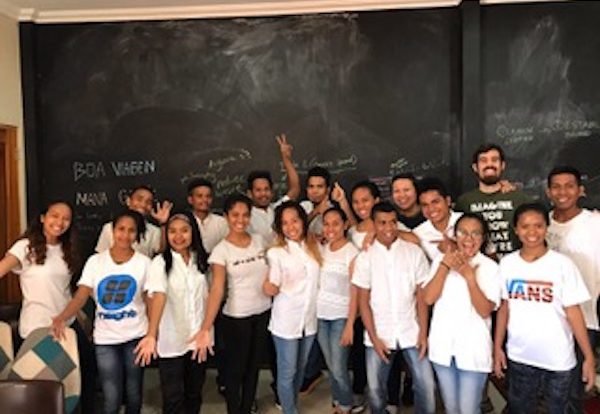Co-founder, Mark Notaras featured middle back row
Tell us about the background of your social enterprise, Timor –Leste food lab, and how you became involved?
Agora Food Studio under the Timor-Leste Food Lab started as a result of working in Timor-Leste for several years on community development, agriculture, nutrition and youth training programs. These programs were often there to support communities utilise their own resources – natural resources including food for their own development. However programs themselves and the organisations that support them were not using local foods themselves, which of course undermines their capacity to engage communities. Most of the food in the country is imported, especially proteins and grains. According to the most recent surveys there is also a nutrition crisis with approximately 50% of children having stunted growth. At the same time the country has unique bio-diversity that is not being leveraged to improve people’s livelihoods, particularly in rural areas.
We saw a gap in the eating market – in the capital Dili – to promote local food directly and decided to found AFS in January 2016 and open for business in August 2016. Having never run a hospitality enterprise before, we had to learn from scratch and also build a team from scratch. We’re mentoring and coaching up a generation of young Timorese food, coffee and tourism entrepreneurs to eventually run their own enterprises.

AFS Founder Alva Lim and Kitchen Chefs illustrating how to make a katupa (rice ball). Image courtesy of @alvalim
We understand that Agora Food Studio is a key part of your organisation. Can you explain further its background, and how it functions as part of your enterprise?
As a fully functioning restaurant, Agora Food Studio provides the sustainable foundation to the enterprise. It provides continual revenue to fund our mentoring programs and gives trainees real time experience in customer service, food preparation and innovation, as well as food education and training. Youth entrepreneurs receive daily feedback on their work performance and the products they create in the kitchen and bar etc. In addition to being a daytime restaurant, Agora is also a meeting place for like-minded organisations working sustainably to promote healthy, seasonal local foods and related products, including coffee, pottery and craft products.
Your organisation has a unique philosophy: “Food should be good, clean and fair for producers, eaters and the environment. We believe in a food system that celebrates biodiversity and nourishes the planet; a food system that creates healthy communities where everyone can eat, and eat well.” Can you explain more about this philosophy and the motivation behind it? How does being located in Timor –Leste allow you to implement this unique approach?
“Good, clean, fair food” is the philosophy of Slow Food International. Long before Agora Food Studio was conceived, we co-founded a Slow Food convivium in Dili in 2014 along with Timorese chefs and activists. As a community passionate about promoting local food we volunteered our time and resources to host, pop-up events, coffee cupping, youth trainings etc. Since those days, three businesses promoting local foods have been established: Agora Food Studio, Dilicious Timor and Distillery Lokal.
TL is a good place to promote Slow Food because there is both a huge bounty of unique, seasonal produce and a wealth of traditional knowledge still available. A tremendous opportunity exists to share these unique foods and the stories behind them across the country and with international residents and travellers, from which these foods are hidden. In reality many communities are practicing “slow food” principles, although this is changing rapidly due to the proliferation of fast and imported foods. TL is also at the early stages of developing an overweight middle class (rates of lifestyle diseases are still much lower here than in neighbouring South-East Asian and Pacific Island countries). Still, the ticking time bomb of eating badly will catch up with Timor if people’s eating habits continue to move away from whole foods and towards convenience foods.
You are also members of the “Slow Food Movement,” can you you explain the aims of this movement and how you are involved?
Slow Food began in Italy in the 1980s as a response to the proliferation of unhealthy, polluting fast food. It has now spread to over 160 countries of which Timor-Leste is one of the newest members. It’s an important way to connect to likeminded restaurants, producers and researchers from around the world. The showcase gathering of the world’s Slow Food members is Terra Madre/Salone del Gusto, which will take place in Turin, Italy in September of this year. This year’s theme is “Food for Change”. 2018 is hopefully the first time Timor-Leste will host a stall at this incredible event,we are presently seeking support to send a delegation, including sending female chefs to represent their country for the first time.
The Agora Food Studio has also developed programmes for young adults to help them develop their potential. Can you tell us more about this approach and the programs supporting young adults? We’d love to hear some of the success stories.
Ours is a mentoring and coaching approach, which is based on connecting staff with their passions and people who can support them to realise the skills needed to be the best in their field. As well as training people in essential skills for the kitchen or the bar, we also focus on developing English skills, financial literacy, and communication and management skills. Our key approach is to take risk from the start, our restaurant; Agora Food Studio has been the key success story along with the community programs that support it.

AFS Chef Arnaldo “Kelo” Araujo shows Timorese school children how to make a healthier salad from local ingredients. Image courtesy of @alvalim
Over 90% of your ingredients are sourced locally,what programs do you offer to support local framers, and what has been the reaction to these initiatives from the community?
We have relationships with several farmers or small farming groups where we are buying products not previously sold beyond small local markets, such as plants like Monkey Tail Plant or Job’s Tears.
Sourcing products regularly is not easy because people are subsistence farmers rather than commercial farmers. A lot of products are foraged rather than farmed for a specific market. Transport options are few to some of the more remote parts of Timor-Leste. At this stage we depend a lot on our staff to bring these products back from family trips. To make these purchases more regular will require time and some training to make sure both that farmers get a fair price but also that the quality is high enough to serve on a plate or value-add (e.g. preserves, drinks, pickles etc).
There are other projects in Timor-Leste introducing farmer training – DFAT-funded TOMAK and USAID-funded Avansa, which we welcome because they are attempting to build farmer skills in the areas of farming as a business and financial literacy which are significant gaps at the moment. Businesses like ours definitely wish to work more closely with farmers but lack the resources and time to be in the field. A whole of value-chain approach (a popular expression at the moment) is required to ensure that all players along the value chain,farmers, traders, wholesalers, retailers, restaurants and end-users all get a fair slice of the pie. Achieving this in an economy in transition like Timor-Leste’s will take a lot of time and trial and error. One way to start the process of establishing new markets for traditional products is to hold events, fairs, and tastings which bring together producers and eaters in group conversation. Again this involves resources and encouragement given people are often busy in their own part of the system. We all need to be conscious of the overall ecosystem we’re operating in.
Do you receive support from local and national authorities? What has been their reaction to your work?
We partner with a lot of organisations focused on sustainable development including: (Distillery Lokál, Dilicious Timor and PARCIC (People’s Foundation for the Asia Pacific), and also those groups developing local economies including Oxfam and CSR in Timor-Leste and a number of local coffee entrepreneurs and labels, and the Lorosa’e English Language Institute (LELI) which is the building we are situated in. We provide a market-based outlet for many of these organisations to sell their products and test their work because “we reach eaters on a daily basis who are looking to vote with their forks.” We are fortunate to receive very positive reactions from these organisations given that many of them are focused on developing producer capacity and linking producers to the market and we provide an open space for them to test their product.
What are some of the key challenges that Timor-Leste Food Lab faces, and what are your goals for the future? What do you hope to see in the food scene in Timor-Leste 5 years from now?
We face a number of challenges, the major ones being:
Economic and political uncertainty – due to the country having two parliamentary elections within a year, this has resulted in a slow-down in the economy.
Organisation Growth – we are outgrowing our present premises and will need to expand our operations as our first generation of youth food leaders develop fully into being managers of either spin-off, or their own enterprises.
At this stage we are focusing on growing the business year by year.

